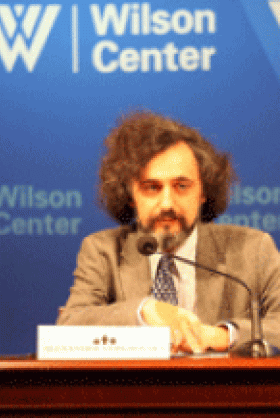Anti-Extremism Policies in Russia and How they Work in Practice


The Russian government has developed a reputation for using anti-extremism laws as a tool against its political opposition, but the reality is far more complex according to Alexander Verkhovsky, Director, SOVA Center for Information and Analysis, Moscow and Reagan Fascell Democracy Fellow, National Endowment for Democracy. Speaking at a 14 January 2013 lecture at the Kennan Institute, Verkhovsky contended that anti-extremism has a dual meaning in Russia: one under law, and one under politics. “Russia does have extremists,” Verkhovsky explained, “and crimes are committed based on extremist ideology or hatred. But the composition of the laws addressing this very real threat, and the enforcement of these laws, produce their own problems.”
The most simplistic explanation of anti-extremism laws and enforcement is that it is a tool of state repression. Yet, Verkhovsky observed, almost none of the protesters in the recent political mass protests were charged under one of the anti-extremism laws. Last year, there were 29 persons convicted for speech that was not hate speech, or for membership in a banned organization, but this number is down from 36 the year before. Few have been convicted and imprisoned under anti-extremism laws. So, Verkhovsky asked, if this is not a serious tool for political oppression, what is it used for?
The definition of extremism under these laws is basically a list of proscribed actions: terrorism, violent hate crimes, hate speech, etc. The hate crime statutes are quite similar to European laws, but the list of protected groups, and consequently prosecuted individuals, has produced some strange results. The members of Pussy Riot, who performed an anti-Putin “punk prayer” in an Orthodox cathedral, were convicted under these provisions. Dissident billionaire Alexander Lebedev has been prosecuted for a “politically motivated hate crime” for hitting another guest on a talk show.
Yet overall, the hate crime legislation works more or less properly, according to Verkhovsky. It is used to prosecute really dangerous violent groups and has led to a decrease in the number of violent hate crimes in 2011 (25 murders) from 2008 (116 murders). Verkhovsky added that it would be wrong to ascribe this decrease to the Russian state refocusing its attention to the political opposition. The decline in hate crimes was well underway before the protest movement started, he noted.
The problem with Russia’s anti-extremism laws is vague language that can be interpreted too broadly. The prohibition against “inciting social discord” can reasonably mean that trade unions are guilty by definition. Language barring “inciting religious discord” can and is used to ban the proselytizing activity of religions. The ban against “public incitement” to an “open list of people” has no practical limit, and would seem to open anyone to jeopardy who uses the internet to make provocative comments. “In the past, our democratic forces used to press law enforcement to go after any instance of bad speech,” Verkhovsky said. “Now, law enforcement uses these open definitions under the law to go after everybody.” In 2012 we have seen, for the first time in the post-Soviet period, more persons convicted for hate speech then for hate crimes. Hate speech is an easier target, Verkhovsky warned, and that may have real consequences for police action against the perpetrators of real hate crimes.
Another unintended consequence of the law is the difficulty the prosecutors and the courts have had in determining just what writings should be banned or prosecuted. The solution the courts and prosecutors found was to convene academic experts to render judgments. Having a roster of “experts” on call may have lightened the caseload on the police and the courts, but it has also opened the door to a corrupt process. The resulting system has produced a number of examples where the intention of the law has been turned on its head. Inconvenient writings, and writers, get banned as extremist; yet “experts” have dismissed the presence of a hate component to some racially motivated assaults. “The situation has led to protests against bad experts,” Verkhovsky noted, “but no one is targeting the law itself.” One reason is that many democratically oriented people in Russia still believe that it is possible to prohibit “bad opinions” as such. For example, there have not been protests against the very strange idea of creating a list of banned books, videos and other materials.
Balancing the need to combat extremism in society with political and religious freedom is never an easy task. “I don’t think there is a quick or easy change for Russian society or the political regime,” Verkhovsky concluded. “I do hope for a consensus that the legislation as written is counterproductive for all.”
F. Joseph Dresen
Author


Kennan Institute
After more than 50 years as a vital part of the Wilson Center legacy, the Kennan Institute has become an independent think tank. You can find the current website for the Kennan Institute at kennaninstitute.org. Please look for future announcements about partnership activities between the Wilson Center and the Kennan Institute at Wilson Center Press Room. The Kennan Institute is the premier US center for advanced research on Eurasia and the oldest and largest regional program at the Woodrow Wilson International Center for Scholars. The Kennan Institute is committed to improving American understanding of Russia, Ukraine, Central Asia, the South Caucasus, and the surrounding region through research and exchange. Read more




